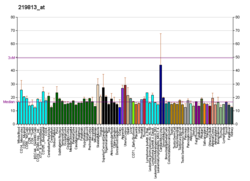LATS1
Large tumor suppressor kinase 1 (LATS1) is an enzyme that in humans is encoded by the LATS1 gene.[5][6][7]
It has been associated with the Hippo signaling pathway.[8]
The protein encoded by this gene is a putative serine/threonine kinase that localizes to the mitotic apparatus and complexes with cell cycle controller CDC2 kinase in early mitosis. The protein is phosphorylated in a cell-cycle dependent manner, with late prophase phosphorylation remaining through metaphase. The N-terminal region of the protein binds CDC2 to form a complex showing reduced histone H1 kinase activity, indicating a role as a negative regulator of CDC2/cyclin A. In addition, the C-terminal kinase domain binds to its own N-terminal region, suggesting potential negative regulation through interference with complex formation via intramolecular binding. Biochemical and genetic data suggest a role as a tumor suppressor. This is supported by studies in knockout mice showing development of soft-tissue sarcomas, ovarian stromal cell tumors and a high sensitivity to carcinogenic treatments.[7]
Interactions
LATS1 has been shown to interact with Zyxin[9] and Cdk1.[5]
References
- ^ a b c GRCh38: Ensembl release 89: ENSG00000131023 – Ensembl, May 2017
- ^ a b c GRCm38: Ensembl release 89: ENSMUSG00000040021 – Ensembl, May 2017
- ^ "Human PubMed Reference:". National Center for Biotechnology Information, U.S. National Library of Medicine.
- ^ "Mouse PubMed Reference:". National Center for Biotechnology Information, U.S. National Library of Medicine.
- ^ a b Tao W, Zhang S, Turenchalk GS, Stewart RA, St John MA, Chen W, Xu T (February 1999). "Human homologue of the Drosophila melanogaster lats tumour suppressor modulates CDC2 activity". Nat Genet. 21 (2): 177–81. doi:10.1038/5960. PMID 9988268.
- ^ Iida S, Hirota T, Morisaki T, Marumoto T, Hara T, Kuninaka S, Honda S, Kosai K, Kawasuji M, Pallas DC, Saya H (July 2004). "Tumor suppressor WARTS ensures genomic integrity by regulating both mitotic progression and G1 tetraploidy checkpoint function". Oncogene. 23 (31): 5266–74. doi:10.1038/sj.onc.1207623. PMID 15122335.
- ^ a b "Entrez Gene: LATS1 LATS, large tumor suppressor, homolog 1 (Drosophila)".
- ^ Hao Y, Chun A, Cheung K, Rashidi B, Yang X (February 2008). "Tumor suppressor LATS1 is a negative regulator of oncogene YAP". J. Biol. Chem. 283 (9): 5496–509. doi:10.1074/jbc.M709037200. PMID 18158288.
- ^ Hirota, T; Morisaki T; Nishiyama Y; Marumoto T; Tada K; Hara T; Masuko N; Inagaki M; Hatakeyama K; Saya H (May 2000). "Zyxin, a regulator of actin filament assembly, targets the mitotic apparatus by interacting with h-warts/LATS1 tumor suppressor". J. Cell Biol. 149 (5): 1073–86. doi:10.1083/jcb.149.5.1073. ISSN 0021-9525. PMC 2174824. PMID 10831611.
Further reading
- Xu T, Wang W, Zhang S, et al. (1995). "Identifying tumor suppressors in genetic mosaics: the Drosophila lats gene encodes a putative protein kinase". Development. 121 (4): 1053–63. PMID 7743921.
- St John MA, Tao W, Fei X, et al. (1999). "Mice deficient of Lats1 develop soft-tissue sarcomas, ovarian tumours and pituitary dysfunction". Nat. Genet. 21 (2): 182–6. doi:10.1038/5965. PMID 9988269.
- Nishiyama Y, Hirota T, Morisaki T, et al. (1999). "A human homolog of Drosophila warts tumor suppressor, h-warts, localized to mitotic apparatus and specifically phosphorylated during mitosis". FEBS Lett. 459 (2): 159–65. doi:10.1016/S0014-5793(99)01224-7. PMID 10518011.
- Hirota T, Morisaki T, Nishiyama Y, et al. (2000). "Zyxin, a regulator of actin filament assembly, targets the mitotic apparatus by interacting with h-warts/LATS1 tumor suppressor". J. Cell Biol. 149 (5): 1073–86. doi:10.1083/jcb.149.5.1073. PMC 2174824. PMID 10831611.
- Morisaki T, Hirota T, Iida S, et al. (2002). "WARTS tumor suppressor is phosphorylated by Cdc2/cyclin B at spindle poles during mitosis". FEBS Lett. 529 (2–3): 319–24. doi:10.1016/S0014-5793(02)03360-4. PMID 12372621.
- Hisaoka M, Tanaka A, Hashimoto H (2002). "Molecular alterations of h-warts/LATS1 tumor suppressor in human soft tissue sarcoma". Lab. Invest. 82 (10): 1427–35. doi:10.1097/01.lab.0000032381.68634.ca. PMID 12379777.
- Strausberg RL, Feingold EA, Grouse LH, et al. (2003). "Generation and initial analysis of more than 15,000 full-length human and mouse cDNA sequences". Proc. Natl. Acad. Sci. U.S.A. 99 (26): 16899–903. Bibcode:2002PNAS...9916899M. doi:10.1073/pnas.242603899. PMC 139241. PMID 12477932.
- Kamikubo Y, Takaori-Kondo A, Uchiyama T, Hori T (2003). "Inhibition of cell growth by conditional expression of kpm, a human homologue of Drosophila warts/lats tumor suppressor". J. Biol. Chem. 278 (20): 17609–14. doi:10.1074/jbc.M211974200. PMID 12624101.
- Brill LM, Salomon AR, Ficarro SB, et al. (2004). "Robust phosphoproteomic profiling of tyrosine phosphorylation sites from human T cells using immobilized metal affinity chromatography and tandem mass spectrometry". Anal. Chem. 76 (10): 2763–72. doi:10.1021/ac035352d. PMID 15144186.
- Yang X, Yu K, Hao Y, et al. (2004). "LATS1 tumour suppressor affects cytokinesis by inhibiting LIMK1". Nat. Cell Biol. 6 (7): 609–17. doi:10.1038/ncb1140. PMID 15220930.
- Beausoleil SA, Jedrychowski M, Schwartz D, et al. (2004). "Large-scale characterization of HeLa cell nuclear phosphoproteins". Proc. Natl. Acad. Sci. U.S.A. 101 (33): 12130–5. Bibcode:2004PNAS..10112130B. doi:10.1073/pnas.0404720101. PMC 514446. PMID 15302935.
- Gerhard DS, Wagner L, Feingold EA, et al. (2004). "The status, quality, and expansion of the NIH full-length cDNA project: the Mammalian Gene Collection (MGC)". Genome Res. 14 (10B): 2121–7. doi:10.1101/gr.2596504. PMC 528928. PMID 15489334.
- Chan EH, Nousiainen M, Chalamalasetty RB, et al. (2005). "The Ste20-like kinase Mst2 activates the human large tumor suppressor kinase Lats1". Oncogene. 24 (12): 2076–86. doi:10.1038/sj.onc.1208445. PMID 15688006.
- Takahashi Y, Miyoshi Y, Takahata C, et al. (2005). "Down-regulation of LATS1 and LATS2 mRNA expression by promoter hypermethylation and its association with biologically aggressive phenotype in human breast cancers". Clin. Cancer Res. 11 (4): 1380–5. doi:10.1158/1078-0432.CCR-04-1773. PMID 15746036.
- Kuninaka S, Nomura M, Hirota T, et al. (2005). "The tumor suppressor WARTS activates the Omi / HtrA2-dependent pathway of cell death". Oncogene. 24 (34): 5287–98. doi:10.1038/sj.onc.1208682. PMID 16007220.
- Bothos J, Tuttle RL, Ottey M, et al. (2005). "Human LATS1 is a mitotic exit network kinase". Cancer Res. 65 (15): 6568–75. doi:10.1158/0008-5472.CAN-05-0862. PMID 16061636.
- Jiang Z, Li X, Hu J, et al. (2007). "Promoter hypermethylation-mediated down-regulation of LATS1 and LATS2 in human astrocytoma". Neurosci. Res. 56 (4): 450–8. doi:10.1016/j.neures.2006.09.006. PMID 17049657.





